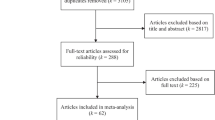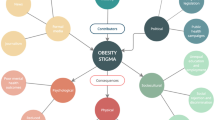Abstract
Background
The association between atypical body weight and mental health remains poorly understood. We examined the relationship between body mass index and mental health in a population-based study of adults that included the full range of body weights, three disorder types, and three levels of mental illness severity.
Methods
Data came from the 2003 Alberta Mental Health Survey (n = 5383), which included a validated, standard instrument for measurement of DSM-IV mental disorders as well as several indicators of psychiatric symptoms. Associations were examined using crosstabulation and chi squared statistics, and logistic regression adjusting for sociodemographic variables.
Results
Findings differed by type and severity of mental illness and by sex and age. For instance, anxiety disorders were elevated among underweight men compared to normal weight men and to women. Substance use disorders were elevated among obese men at younger compared to older ages. Mood disorders were elevated among obese women compared to normal weight women, and subclinical anxiety/depression was reduced among obese men compared to normal weight men and to women.
Conclusions
These analyses highlight the importance of considering type of mental illness, level of severity, sex and age when examining the relationship between BMI and mental health. The diversity of patterns observed, detectable at the population level, warrant further examination and monitoring.
Similar content being viewed by others
Notes
Including eating disorders, which were excluded in multivariate analyses.
References
Bray GA (2003) Risks of obesity. Endocrinol Metab Clin North Am 32:787–804
Carr D, Friedman MA (2005) Is obesity stigmatizing? Body weight, perceived discrimination, and psychological well-being in the United States. J Health Soc Behav 46:244–259
Doll HA, Petersen SEK, Stewart-Brown SL (2000) Obesity and physical and emotional well-being: associations between body mass index, chronic illness, and the physical and mental components of the SF-36 questionnaire. Obes Res 8:160–170
Ford ES, Moriarty DG, Zack MM, Mokdad AH, Chapman DP (2001) Self-reported body mass index and health-related quality of life: findings from the behavioral risk factor surveillance system. Obes Res 9:21–31
Friedman MA, Brownell KD (1995) Psychological correlates of obesity: moving to the next research generation. Psychol Bull 117:3–20
Groesz LM, Levine MP, Murnen SK (2002) The effect of experimental presentation of thin media images on body satisfaction: a meta-analytic review. Int J Eat Disord 31:1–16
Jorm AF, Korten AE, Christensen H, Jacomb PA, Rodgers B, Parslow RA (2003) Association of obesity with anxiety, depression and emotional well-being: a community survey. Aust N Z J Public Health 27:434–440
Larsson U, Karlsson J, Sullivan M (2002) Impact of overweight and obesity on health-related quality of life – a Swedish population study. Int J Obes 26:417–424
McElroy SL, Kotwal R, Malhotra S, Nelson EB, Keck PE, Nemeroff CB (2004) Are mood disorders and obesity related? A review for the mental health professional. J Clin Psychiatry 65:634–651
McVey G, Tweed S, Blackmore E (2005) Correlates of weight loss and muscle-gaining behavior in 10– to 14-year old males and females. Prev Med 40:1–9
Mini-International Neuropsychiatric Interview (M.I.N.I.): The development and validation of a structured diagnostic psychiatric interview for DSM-IV and ICD-10. J Clin Psychiatry 20(Suppl):22–33
Narrow WE, Rae DS, Robins LN, Regier DA (2002) Revised prevalence estimates of mental disorders in the United States: using a clinical significance criterion to reconcile 2 surveys’ estimates. Arch Gen Psychiatry 59:115–123
Patten SB, Adair CE, Williams JVA, Brandt R, Wang JL, Casebeer A, Beauséjour P (2006) Assessment of mental health and illness by telephone survey: experience with an Alberta mental health survey. Chron Dis Can 27:99–109
Polivy J, Herman CP (2005) Mental health and eating behaviours: a bidirectional relation. Can J Public Health 96:S43–S46
Puhl R, Brownell KD (2001) Bias, discrimination, and obesity. Obes Res 9:788–805
Rabin R, de Charro F (2001) EQ-5D: a measure of health status from the EuroQol Group. Ann Med 33:337–343
Rohrer JE, Pierce JR Jr, Blackburn C (2005) Lifestyle and mental health. Prev Med 40:438–443
Rowland ML (1990) Self-reported weight and height. Am J Clin Nutr 52:1125–1133
Sargent JD, Blanchflower DG (1994) Obesity and stature in adolescence and earnings in young adulthood. Analysis of a British birth cohort. Arch Pediatr Adolesc Med 148:681–687
Sheehan DV, LeCrubier Y, Sheehan H, Amorim P, Janavs J, Weiller E et al (1998) The Mini-international neuropsychiatric interview (M.I.N.I.): The development and validation of a structured diagnostic psychiatric interview for DSM-IV and ICD-10. J Clin Psychiatry Suppl 20:22–33
Stearns PN (1997) Fat history: bodies and beauty in the modern west. New York University Press, New York
The EQ-5D quality of life instrument [http://www.gs1.q4matics.com/EuroqolPublishWeb/]
Tjepkema M, Shields M (2005) Measured obesity: adult obesity in Canada. In Nutrition: findings from the Canadian community health survey. Issue no. 1. Statistics Canada Cat. No. 82–620-MWE
Whitaker RC (2004) Mental health and obesity in pediatric primary care [editorial]. Arch Pediatr Adolesc Med 158:826–828
Author information
Authors and Affiliations
Corresponding author
Rights and permissions
About this article
Cite this article
McLaren, L., Beck, C.A., Patten, S.B. et al. The relationship between body mass index and mental health. Soc Psychiat Epidemiol 43, 63–71 (2008). https://doi.org/10.1007/s00127-007-0269-x
Accepted:
Published:
Issue Date:
DOI: https://doi.org/10.1007/s00127-007-0269-x




